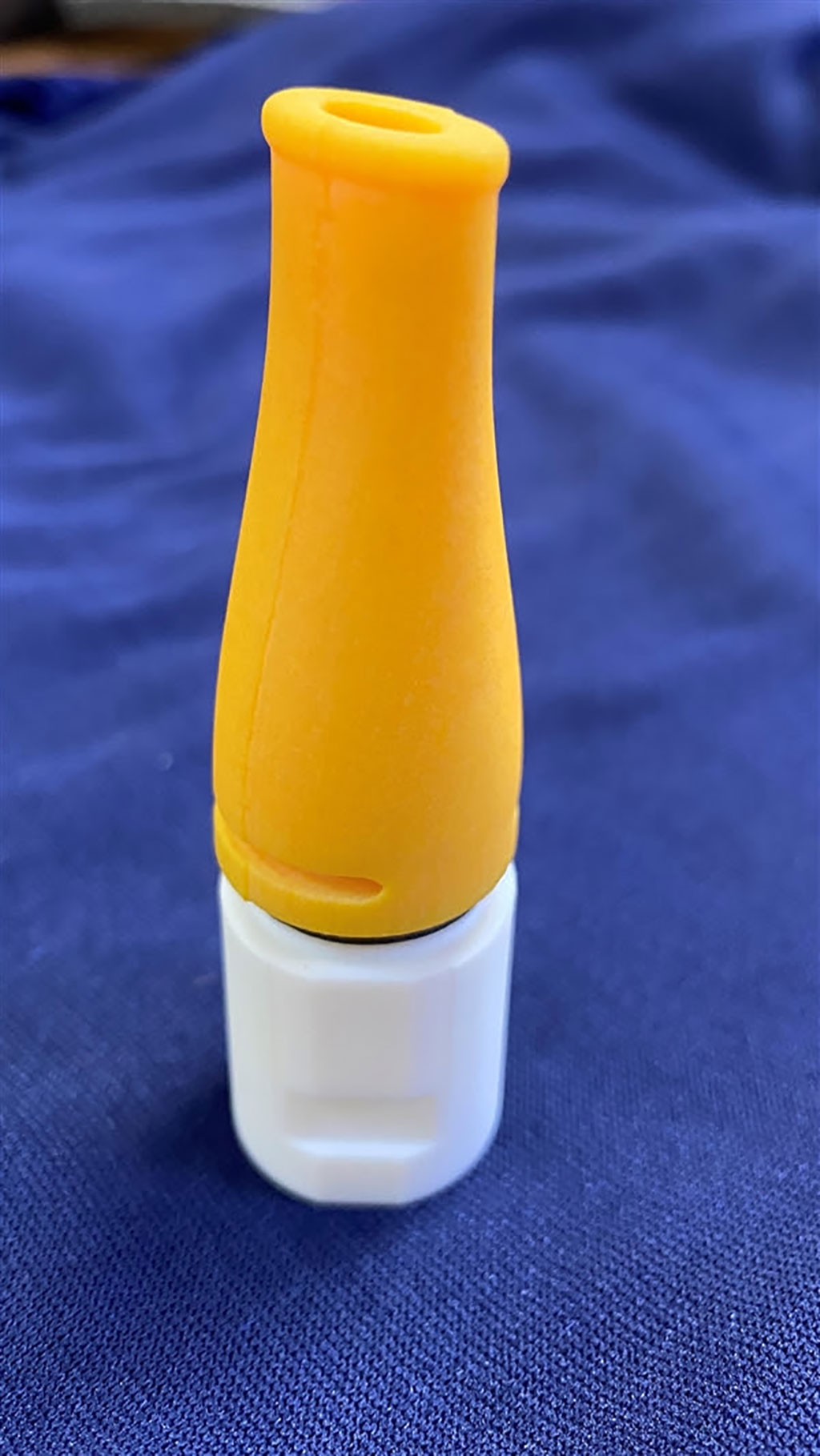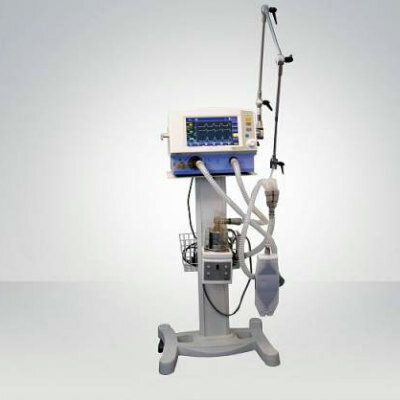New One Minute Coronavirus Test Offers More than 90% Accuracy at Dramatically Lower Price
|
By HospiMedica International staff writers Posted on 14 May 2020 |

Image: The breath-test device developed by Professor Gabby Sarusi at Ben-Gurion University of the Negev (Photo courtesy of Professor Gabby Sarusi)
Israeli researchers have developed and are now validating a test that identifies carriers of the COVID-19 virus in less than a minute with greater than 90% accuracy and at a dramatically lower price than any other method available.
The test, developed by Ben-Gurion University of the Negev {(BGU) Beer-Sheva, Israel}, uses a chip with a dense array of metamaterial sensors that was designed specifically for this purpose. Particles from a simple breath test or throat and nose swabs, such as those already currently used for other tests, are placed on the chip. The system then analyzes the biological sample and provides an accurate positive/negative result within a minute via a cloud-connected system. The point-of-care device automatically backs up the results into a database that can be shared by authorities, making it easier than ever to track the course of the virus, as well as triage and treat patients.
The new method is based on the change in the resonance in the THz spectral range imposed by the coronavirus through a THz spectroscopy performed on the device. This spectral range has been employed in recent decades for the fast detection and identification of biological samples. Being electro-optical in nature, rather than biochemical, the test is not sensitive to environmental factors that can affect results of current testing methods.
Each test kit would cost between USD 50-100 to produce, which is far less than the current coronavirus test kits based on amplifying and identifying the viral RNA sequences, and therefore depend on costly reagents and biochemical reactions. Additionally, these PCR-based kits take hours, and in many cases days, to yield results and require logistically complicated shipping and handling of sensitive and infectious biological samples. In clinical trials, the test has demonstrated a better than 90% success rate as compared to Polymerase Chain Reaction (PCR) tests. Ongoing trials will now seek to determine if the test can identify the specific stage of COVID-19 infection as well as its presence.
"Right from the beginning of the trials, we received statistically significant results in line with our simulations and PCR tests," said Prof. Sarusi, deputy head for research at the School of Electrical and Computer Engineering and a faculty member of the Electro-Optical Engineering Unit at BGU. "We are continuing clinical trials and will compare samples from COVID-19 patients with samples from patients with other diseases to see if we can identify the different stages of the COVID-19 infection."
Related Links:
Ben-Gurion University of the Negev (BGU)
The test, developed by Ben-Gurion University of the Negev {(BGU) Beer-Sheva, Israel}, uses a chip with a dense array of metamaterial sensors that was designed specifically for this purpose. Particles from a simple breath test or throat and nose swabs, such as those already currently used for other tests, are placed on the chip. The system then analyzes the biological sample and provides an accurate positive/negative result within a minute via a cloud-connected system. The point-of-care device automatically backs up the results into a database that can be shared by authorities, making it easier than ever to track the course of the virus, as well as triage and treat patients.
The new method is based on the change in the resonance in the THz spectral range imposed by the coronavirus through a THz spectroscopy performed on the device. This spectral range has been employed in recent decades for the fast detection and identification of biological samples. Being electro-optical in nature, rather than biochemical, the test is not sensitive to environmental factors that can affect results of current testing methods.
Each test kit would cost between USD 50-100 to produce, which is far less than the current coronavirus test kits based on amplifying and identifying the viral RNA sequences, and therefore depend on costly reagents and biochemical reactions. Additionally, these PCR-based kits take hours, and in many cases days, to yield results and require logistically complicated shipping and handling of sensitive and infectious biological samples. In clinical trials, the test has demonstrated a better than 90% success rate as compared to Polymerase Chain Reaction (PCR) tests. Ongoing trials will now seek to determine if the test can identify the specific stage of COVID-19 infection as well as its presence.
"Right from the beginning of the trials, we received statistically significant results in line with our simulations and PCR tests," said Prof. Sarusi, deputy head for research at the School of Electrical and Computer Engineering and a faculty member of the Electro-Optical Engineering Unit at BGU. "We are continuing clinical trials and will compare samples from COVID-19 patients with samples from patients with other diseases to see if we can identify the different stages of the COVID-19 infection."
Related Links:
Ben-Gurion University of the Negev (BGU)
Latest COVID-19 News
- Low-Cost System Detects SARS-CoV-2 Virus in Hospital Air Using High-Tech Bubbles
- World's First Inhalable COVID-19 Vaccine Approved in China
- COVID-19 Vaccine Patch Fights SARS-CoV-2 Variants Better than Needles
- Blood Viscosity Testing Can Predict Risk of Death in Hospitalized COVID-19 Patients
- ‘Covid Computer’ Uses AI to Detect COVID-19 from Chest CT Scans
- MRI Lung-Imaging Technique Shows Cause of Long-COVID Symptoms
- Chest CT Scans of COVID-19 Patients Could Help Distinguish Between SARS-CoV-2 Variants
- Specialized MRI Detects Lung Abnormalities in Non-Hospitalized Long COVID Patients
- AI Algorithm Identifies Hospitalized Patients at Highest Risk of Dying From COVID-19
- Sweat Sensor Detects Key Biomarkers That Provide Early Warning of COVID-19 and Flu
- Study Assesses Impact of COVID-19 on Ventilation/Perfusion Scintigraphy
- CT Imaging Study Finds Vaccination Reduces Risk of COVID-19 Associated Pulmonary Embolism
- Third Day in Hospital a ‘Tipping Point’ in Severity of COVID-19 Pneumonia
- Longer Interval Between COVID-19 Vaccines Generates Up to Nine Times as Many Antibodies
- AI Model for Monitoring COVID-19 Predicts Mortality Within First 30 Days of Admission
- AI Predicts COVID Prognosis at Near-Expert Level Based Off CT Scans
Channels
Artificial Intelligence
view channel
AI-Powered Algorithm to Revolutionize Detection of Atrial Fibrillation
Atrial fibrillation (AFib), a condition characterized by an irregular and often rapid heart rate, is linked to increased risks of stroke and heart failure. This is because the irregular heartbeat in AFib... Read more
AI Diagnostic Tool Accurately Detects Valvular Disorders Often Missed by Doctors
Doctors generally use stethoscopes to listen for the characteristic lub-dub sounds made by heart valves opening and closing. They also listen for less prominent sounds that indicate problems with these valves.... Read moreCritical Care
view channel
Powerful AI Risk Assessment Tool Predicts Outcomes in Heart Failure Patients
Heart failure is a serious condition where the heart cannot pump sufficient blood to meet the body's needs, leading to symptoms like fatigue, weakness, and swelling in the legs and feet, and it can ultimately... Read more
Peptide-Based Hydrogels Repair Damaged Organs and Tissues On-The-Spot
Scientists have ingeniously combined biomedical expertise with nature-inspired engineering to develop a jelly-like material that holds significant promise for immediate repairs to a wide variety of damaged... Read more
One-Hour Endoscopic Procedure Could Eliminate Need for Insulin for Type 2 Diabetes
Over 37 million Americans are diagnosed with diabetes, and more than 90% of these cases are Type 2 diabetes. This form of diabetes is most commonly seen in individuals over 45, though an increasing number... Read moreSurgical Techniques
view channel
Miniaturized Implantable Multi-Sensors Device to Monitor Vessels Health
Researchers have embarked on a project to develop a multi-sensing device that can be implanted into blood vessels like peripheral veins or arteries to monitor a range of bodily parameters and overall health status.... Read more
Tiny Robots Made Out Of Carbon Could Conduct Colonoscopy, Pelvic Exam or Blood Test
Researchers at the University of Alberta (Edmonton, AB, Canada) are developing cutting-edge robots so tiny that they are invisible to the naked eye but are capable of traveling through the human body to... Read more
Miniaturized Ultrasonic Scalpel Enables Faster and Safer Robotic-Assisted Surgery
Robot-assisted surgery (RAS) has gained significant popularity in recent years and is now extensively used across various surgical fields such as urology, gynecology, and cardiology. These surgeries, performed... Read morePatient Care
view channelFirst-Of-Its-Kind Portable Germicidal Light Technology Disinfects High-Touch Clinical Surfaces in Seconds
Reducing healthcare-acquired infections (HAIs) remains a pressing issue within global healthcare systems. In the United States alone, 1.7 million patients contract HAIs annually, leading to approximately... Read more
Surgical Capacity Optimization Solution Helps Hospitals Boost OR Utilization
An innovative solution has the capability to transform surgical capacity utilization by targeting the root cause of surgical block time inefficiencies. Fujitsu Limited’s (Tokyo, Japan) Surgical Capacity... Read more
Game-Changing Innovation in Surgical Instrument Sterilization Significantly Improves OR Throughput
A groundbreaking innovation enables hospitals to significantly improve instrument processing time and throughput in operating rooms (ORs) and sterile processing departments. Turbett Surgical, Inc.... Read moreHealth IT
view channel
Machine Learning Model Improves Mortality Risk Prediction for Cardiac Surgery Patients
Machine learning algorithms have been deployed to create predictive models in various medical fields, with some demonstrating improved outcomes compared to their standard-of-care counterparts.... Read more
Strategic Collaboration to Develop and Integrate Generative AI into Healthcare
Top industry experts have underscored the immediate requirement for healthcare systems and hospitals to respond to severe cost and margin pressures. Close to half of U.S. hospitals ended 2022 in the red... Read more
AI-Enabled Operating Rooms Solution Helps Hospitals Maximize Utilization and Unlock Capacity
For healthcare organizations, optimizing operating room (OR) utilization during prime time hours is a complex challenge. Surgeons and clinics face difficulties in finding available slots for booking cases,... Read more
AI Predicts Pancreatic Cancer Three Years before Diagnosis from Patients’ Medical Records
Screening for common cancers like breast, cervix, and prostate cancer relies on relatively simple and highly effective techniques, such as mammograms, Pap smears, and blood tests. These methods have revolutionized... Read morePoint of Care
view channel
Critical Bleeding Management System to Help Hospitals Further Standardize Viscoelastic Testing
Surgical procedures are often accompanied by significant blood loss and the subsequent high likelihood of the need for allogeneic blood transfusions. These transfusions, while critical, are linked to various... Read more
Point of Care HIV Test Enables Early Infection Diagnosis for Infants
Early diagnosis and initiation of treatment are crucial for the survival of infants infected with HIV (human immunodeficiency virus). Without treatment, approximately 50% of infants who acquire HIV during... Read more
Whole Blood Rapid Test Aids Assessment of Concussion at Patient's Bedside
In the United States annually, approximately five million individuals seek emergency department care for traumatic brain injuries (TBIs), yet over half of those suspecting a concussion may never get it checked.... Read more
New Generation Glucose Hospital Meter System Ensures Accurate, Interference-Free and Safe Use
A new generation glucose hospital meter system now comes with several features that make hospital glucose testing easier and more secure while continuing to offer accuracy, freedom from interference, and... Read moreBusiness
view channel
Johnson & Johnson Acquires Cardiovascular Medical Device Company Shockwave Medical
Johnson & Johnson (New Brunswick, N.J., USA) and Shockwave Medical (Santa Clara, CA, USA) have entered into a definitive agreement under which Johnson & Johnson will acquire all of Shockwave’s... Read more















